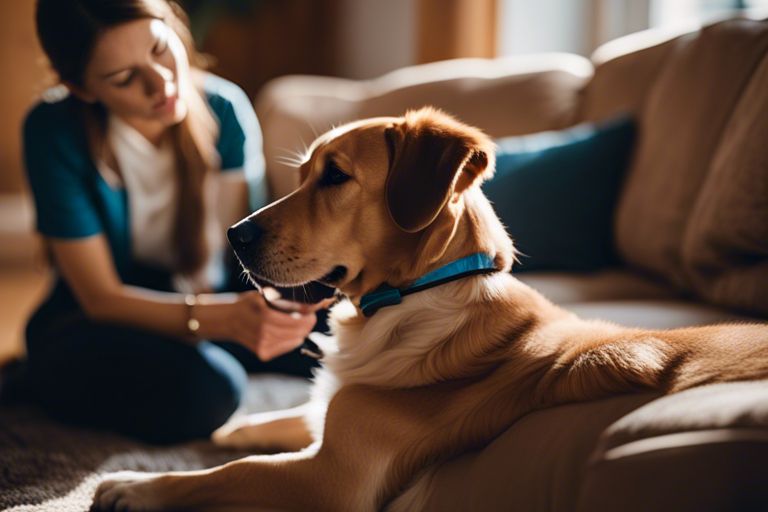Overlooking the symptoms of pneumonia in your dog can lead to serious health complications. Recognizing the signs early can make a significant difference in their treatment and overall well-being. If you notice any of the following signs in your dog, it is crucial to seek veterinary care promptly to ensure proper diagnosis and treatment. Symptoms may include rapid breathing, coughing, lethargy, fever, and loss of appetite. Recall, your vigilance can ultimately save your furry friend’s life.
Key Takeaways:
- Cough: Persistent coughing is one of the most common symptoms of pneumonia in dogs.
- Difficulty Breathing: Labored or rapid breathing, as well as shortness of breath, can indicate pneumonia in dogs.
- Fever: Dogs with pneumonia may develop a fever, accompanied by lethargy and loss of appetite.
Identifying the Symptoms
Respiratory Issues
With pneumonia, your dog may exhibit various respiratory issues such as difficulty breathing, rapid breathing, or shallow breathing. You may notice that your dog is breathing more heavily than usual or is struggling to catch their breath. These signs can be alarming and should prompt a visit to the veterinarian for further evaluation.
If you observe your dog experiencing any of these respiratory symptoms, it is imperative to seek medical attention promptly. Ignoring these signs could lead to worsening of the condition and potential complications.
Coughing and Sneezing
Coughing is a common symptom of pneumonia in dogs. Your dog may have a persistent, hacking cough that can be dry or produce mucus. Additionally, sneezing can also be present, indicating irritation in the respiratory tract. If your dog is coughing excessively or experiencing frequent bouts of sneezing, it is crucial to monitor their condition closely.
Apart from coughing and sneezing, you may also notice your dog exhibiting other signs such as nasal discharge, lethargy, or loss of appetite. These symptoms can provide valuable clues to the underlying cause of your dog’s illness and should not be overlooked.
Breathing Difficulties
Rapid Breathing
The first sign of pneumonia that you may notice in your dog is rapid breathing. This can be characterized by your dog taking quick, shallow breaths more frequently than normal. Any noticeable increase in your dog’s breathing rate should be a cause for concern and prompt you to seek veterinary attention immediately.
Panting
Another common symptom of pneumonia in dogs is increased panting. An increase in panting can be your dog’s way of trying to get more oxygen into their lungs due to breathing difficulties. If you notice your dog panting more than usual, especially when they haven’t been exercising or in a warm environment, it could be a sign of pneumonia.
Panting is a natural response for dogs to cool down, but excessive panting can indicate an underlying problem such as pneumonia. If your dog is panting excessively and showing other symptoms such as coughing or lethargy, it is important to have them evaluated by a veterinarian as soon as possible.
To ensure the health and well-being of your furry friend, it is crucial to keep an eye out for any signs of breathing difficulties such as rapid breathing or increased panting. If you notice any changes in your dog’s breathing patterns, it is best to consult with your veterinarian for a thorough evaluation and proper treatment. Early detection and intervention can help improve your dog’s chances of recovery from pneumonia.
Fever and Discomfort
Your furry friend may show some signs of discomfort when they are suffering from pneumonia. One of the most common symptoms is an elevated body temperature.
Elevated Body Temperature
| Signs | Heating Up |
| What to look for | Warm ears, nose, and feet |
| What you can do | Monitor temperature and consult a vet |
To identify elevated body temperature, you can feel your dog’s ears, nose, and feet. If they feel warmer than usual, it could indicate a fever. Monitoring their temperature with a thermometer designed for dogs and consulting your vet promptly is crucial in managing their condition.
Lethargy and Depression
An indication that your pup is not feeling well is lethargy and depression. They may appear more tired than usual and show disinterest in activities they usually enjoy.
Understanding that lethargy and depression are common symptoms of pneumonia in dogs can help you take swift action in seeking veterinary care. Prompt treatment is important in ensuring your furry companion has the best chance of recovery.
Changes in Appetite and Behavior
Loss of Appetite
Now, an abrupt loss of appetite in your dog can be a concerning symptom of pneumonia. You may notice that your furry friend is not showing interest in their food or treats as they usually do. This lack of appetite can be a result of the infection impacting their sense of smell or taste, making food less appealing to them. It is crucial to monitor your pet’s eating habits closely and consult with your veterinarian if you notice a significant decrease in their food intake.
Withdrawal from Social Interaction
Now, if your dog starts to withdraw from social interaction and seems unusually distant, it could be a sign of pneumonia. Your typically social and affectionate pet may become less interested in playtime, walks, or cuddling. This behavior change is often a result of your dog feeling unwell and needing some time to rest and recuperate. If you notice this withdrawal from social interaction lasting for more than a day or two, it is crucial to seek veterinary advice to determine the underlying cause and appropriate treatment.
Appetite and social behavior changes are common symptoms of pneumonia in dogs. It is crucial to pay close attention to your dog’s behavior and habits to catch any signs of illness early on. Withdrawal from social interaction can indicate that your dog is not feeling well and needs medical attention. Seek prompt veterinary care if you notice these changes in your furry companion.
Physical Examination Findings
Many of the symptoms of pneumonia in dogs can be identified through a physical examination. This may include checking for abnormal lung sounds and enlarged lymph nodes.
Abnormal Lung Sounds
With pneumonia, your veterinarian may hear abnormal sounds when they listen to your dog’s lungs using a stethoscope. These could include crackles, wheezes, or decreased breath sounds. These findings can indicate that there is fluid or inflammation in the lungs, which are common signs of pneumonia.
Enlarged Lymph Nodes
Findings of enlarged lymph nodes during a physical exam could also suggest the presence of pneumonia in dogs. Lymph nodes are small, bean-shaped structures that play a crucial role in the immune system. When they are enlarged, it can indicate that your dog’s body is fighting off an infection, such as pneumonia. Your veterinarian will palpate these lymph nodes, which are often located in the neck, behind the knees, and in other specific areas of the body, to check for any abnormalities.
Lung abnormalities and enlarged lymph nodes are important physical examination findings that can help your veterinarian in diagnosing pneumonia in your dog. If these signs are present during the examination, further tests such as imaging studies or lab work may be recommended to confirm the diagnosis and determine the best treatment plan for your furry companion.
Diagnostic Tests and Procedures
All dog pneumonia symptoms are concerning, and your pup may need a thorough evaluation to determine the underlying cause and severity of the condition. A veterinary visit is crucial at this point. Once you notice any signs of pneumonia in your dog, it’s necessary to act fast. The diagnosis will involve a series of tests and procedures to confirm the condition and determine the appropriate treatment. Visit How to Treat Pneumonia in Dogs to learn more about managing pneumonia in dogs.
X-Rays and Imaging
Tests such as X-rays and other imaging techniques may be used to visualize your dog’s lungs and check for any abnormalities. X-rays can help identify areas of inflammation, infection, or fluids in the lungs. By examining the images, your veterinarian can assess the extent of lung involvement and determine the best treatment plan moving forward.
Blood Tests and Cultures
Blood tests are commonly performed to assess your dog’s overall health status and to check for any signs of infection. Additionally, cultures may be taken from your dog’s respiratory secretions to identify the specific bacteria causing the pneumonia. This information is crucial in determining the most effective antibiotics for treatment.
The results of blood tests and cultures play a significant role in guiding the treatment plan for your dog’s pneumonia. Based on these findings, your veterinarian can tailor the medication specifically to combat the identified infection, leading to a more targeted and successful treatment approach.
To wrap up
Recall, recognizing the symptoms of pneumonia in your dog early on is crucial for a successful recovery. Keep an eye out for signs such as coughing, difficulty breathing, lethargy, and loss of appetite. If you suspect your dog may have pneumonia, it is important to seek veterinary attention promptly to receive a proper diagnosis and treatment plan. Ignoring these symptoms could lead to serious health complications for your furry friend.
By familiarizing yourself with the symptoms of pneumonia in dogs, you can be better equipped to protect your pet’s health and well-being. Regular check-ups with your vet and prompt attention to any signs of illness can help maintain your dog’s overall health. Always be proactive in monitoring your dog’s behavior and seek professional help if you notice any concerning symptoms. Recall, your vigilance could make a significant difference in your dog’s recovery from pneumonia.
FAQ
Q: What are the symptoms of pneumonia in dogs?
A: Symptoms of pneumonia in dogs include coughing, difficulty breathing, nasal discharge, fever, lethargy, lack of appetite, and rapid breathing.
Q: How can I tell if my dog has pneumonia?
A: If you notice any of the symptoms mentioned earlier, especially if they persist for more than a day or two, it is important to take your dog to the veterinarian for a thorough examination and diagnosis.
Q: What causes pneumonia in dogs?
A: Pneumonia in dogs can be caused by bacterial, viral, fungal, or parasitic infections. Inhalation of foreign objects, aspiration of vomit, or a weakened immune system can also contribute to the development of pneumonia.
Q: Can pneumonia in dogs be treated?
A: Yes, pneumonia in dogs can be treated, but the specific treatment will depend on the underlying cause of the infection. Treatment may include antibiotics, anti-inflammatory medications, supportive care, and in severe cases, hospitalization.
Q: How can I prevent pneumonia in my dog?
A: To help prevent pneumonia in your dog, ensure they are up to date on vaccinations, maintain good hygiene, prevent exposure to sick animals, avoid smoking around your dog, and seek prompt veterinary care for any respiratory symptoms or illnesses.
Are strawberries toxic for dogs
Your Dog’s Allergies: Expert Advice
Demystifying Anal Gland Issues in Dogs: Your Comprehensive Guide from the American Kennel Club




